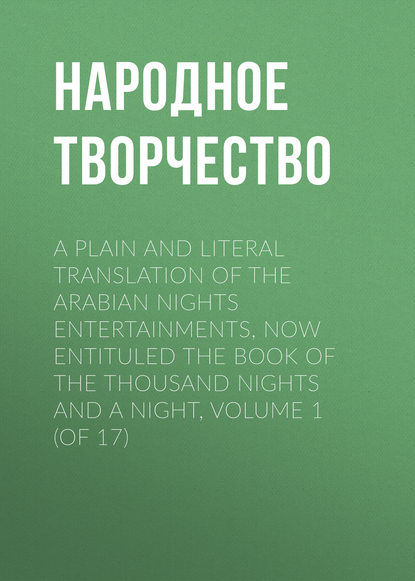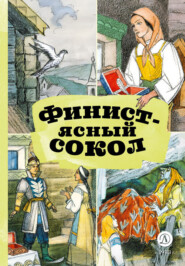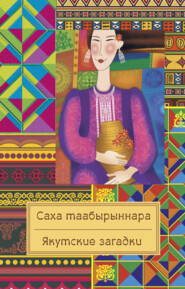По всем вопросам обращайтесь на: info@litportal.ru
(©) 2003-2024.
✖
A plain and literal translation of the Arabian nights entertainments, now entituled The Book of the Thousand Nights and a Night, Volume 1 (of 17)
Настройки чтения
Размер шрифта
Высота строк
Поля
Now when it was the Seventeenth Night,
She said, It hath reached me, O auspicious King, that she stood forth before the Commander of the Faithful and began to tell
THE ELDEST LADY'S TALE
Verily a strange tale is mine and 'tis this: – Yon two black bitches are my eldest sisters by one mother and father; and these two others, she who beareth upon her the signs of stripes and the third our procuratrix are my sisters by another mother. When my father died, each took her share of the heritage and, after a while my mother also deceased, leaving me and my sisters-german three thousand dinars; so each daughter received her portion of a thousand dinars and I the same, albe the youngest. In due course of time my sisters married with the usual festivities and lived with their husbands, who bought merchandise with their wives' monies and set out on their travels together. Thus they threw me off. My brothers-in-law were absent with their wives five years, during which period they spent all the money they had and, becoming bankrupt, deserted my sisters in foreign parts amid stranger folk. After five years my eldest sister returned to me in beggar's gear with her clothes in rags and tatters[302 - Arab. "Sharmutah" (plur. Sharámít) from the root Sharmat, to shred, a favourite Egyptian word also applied in vulgar speech to a strumpet, a punk, a piece. It is also the popular term for strips of jerked or boucaned meat hung up in the sun to dry, and classically called "Kadíd."] and a dirty old mantilla;[303 - Arab. "Izár," the man's waist-cloth opposed to the Ridá or shoulder-cloth, is also the sheet of white calico worn by the poorer Egyptian women out of doors and covering head and hands. See Lane (M. E., chapt. i). The rich prefer a "Habárah" of black silk, and the poor, when they have nothing else, use a bed-sheet.] and truly she was in the foulest and sorriest plight. At first sight I did not know my own sister; but presently I recognised her and said "What state is this?" "O our sister," she replied, "Words cannot undo the done; and the reed of Destiny hath run through what Allah decreed." Then I sent her to the bath and dressed her in a suit of mine own, and boiled for her a bouillon and brought her some good wine and said to her, "O my sister, thou art the eldest, who still standest to us in the stead of father and mother; and, as for the inheritance which came to me as to you twain, Allah hath blessed it and prospered it to me with increase; and my circumstances are easy, for I have made much money by spinning and cleaning silk; and I and you will share my wealth alike." I entreated her with all kindliness and she abode with me a whole year, during which our thoughts and fancies were always full of our other sister. Shortly after she too came home in yet fouler and sorrier plight than that of my eldest sister; and I dealt by her still more honorably than I had done by the first, and each of them had a share of my substance. After a time they said to me, "O our sister, we desire to marry again, for indeed we have not patience to drag on our days without husbands and to lead the lives of widows bewitched;" and I replied, "O eyes of me![304 - i. e. "My dears."] ye have hitherto seen scanty weal in wedlock, for now-a-days good men and true are become rareties and curiosities; nor do I deem your projects advisable, as ye have already made trial of matrimony and have failed." But they would not accept my advice and married without my consent: nevertheless I gave them outfit and dowries out of my money; and they fared forth with their mates. In a mighty little time their husbands played them false and, taking whatever they could lay hands upon, levanted and left them in the lurch. Thereupon they came to me ashamed and in abject case and made their excuses to me, saying, "Pardon our fault and be not wroth with us;[305 - Arab. "Lá tawákhizná:" lit. "do not chastise (or blame) us;" the pop. expression for, "excuse (or pardon) us."] for although thou art younger in years yet art thou older in wit; henceforth we will never make mention of marriage; so take us back as thy handmaidens that we may eat our mouthful." Quoth I, "Welcome to you, O my sisters, there is naught dearer to me than you." And I took them in and redoubled my kindness to them. We ceased not to live after this loving fashion for a full year, when I resolved to sell my wares abroad and first to fit me a conveyance for Bassorah; so I equipped a large ship, and loaded her with merchandise and valuable goods for traffic, and with provaunt and all needful for a voyage, and said to my sisters, "Will ye abide at home whilst I travel, or would ye prefer to accompany me on the voyage?" "We will travel with thee," answered they, "for we cannot bear to be parted from thee." So I divided my monies into two parts, one to accompany me and the other to be left in charge of a trusty person, for, as I said to myself, "Haply some accident may happen to the ship and yet we remain alive; in which case we shall find on our return what may stand us in good stead." I took my two sisters and we went a-voyaging some days and nights; but the master was careless enough to miss his course, and the ship went astray with us and entered a sea other than the sea we sought. For a time we knew naught of this; and the wind blew fair for us ten days, after which the look-out man went aloft to see about him and cried, "Good news!" Then he came down rejoicing and said, "I have seen what seemeth to be a city as 'twere a pigeon." Hereat we rejoiced and, ere an hour of the day had passed, the buildings showed plain in the offing and we asked the Captain, "What is the name of yonder city?" and he answered, "By Allah I wot not, for I never saw it before and never sailed these seas in my life: but, since our troubles have ended in safety, remains for you only to land there with your merchandise and, if you find selling profitable, sell and make your market of what is there; and if not, we will rest here two days and provision ourselves and fare away." So we entered the port and the Captain went up town and was absent awhile, after which he returned to us and said, "Arise; go up into the city and marvel at the works of Allah with His creatures and pray to be preserved from His righteous wrath!" So we landed and going up into the city, saw at the gate men hending staves in hand; but when we drew near them, behold, they had been translated[306 - Arab. "Maskhút," mostly applied to change of shape as man enchanted to monkey, and in vulgar parlance applied to a statue (of stone, etc.). The list of metamorphoses in Al-Islam is longer than that known to Ovid. Those who have seen Petra, the Greek town of the Haurán and the Roman ruins in Northern Africa will readily detect the basis upon which these stories are built. I shall return to this subject in The City of Iram (Night cclxxvi.) and The City of Brass (dlxvii.).] by the anger of Allah and had become stones. Then we entered the city and found all who therein woned into black stones enstoned: not an inhabited house appeared to the espier, nor was there a blower of fire.[307 - A picturesque phrase enough to express a deserted site, a spectacle familiar to the Nomades and always abounding in pathos to the citizens.] We were awe struck at the sight and threaded the market streets where we found the goods and gold and silver left lying in their places; and we were glad and said, "Doubtless there is some mystery in all this." Then we dispersed about the thoroughfares and each busied himself with collecting the wealth and money and rich stuffs, taking scanty heed of friend or comrade. As for myself I went up to the castle which was strongly fortified; and, entering the King's palace by its gate of red gold, found all the vaiselle of gold and silver, and the King himself seated in the midst of his Chamberlains and Nabobs and Emirs and Wazirs; all clad in raiment which confounded man's art. I drew nearer and saw him sitting on a throne incrusted and inlaid with pearls and gems; and his robes were of gold-cloth adorned with jewels of every kind, each one flashing like a star. Around him stood fifty Mamelukes, white slaves, clothed in silks of divers sorts holding their drawn swords in their hands; but when I drew near to them lo! all were black stones. My understanding was confounded at the sight, but I walked on and entered the great hall of the Harím,[308 - The olden "Harem" (or gynæceum, Pers. Zenanah, Serraglio): Harím is also used by synecdoche for the inmates; especially the wife.] whose walls I found hung with tapestries of gold-striped silk and spread with silken carpets embroidered with golden flowers. Here I saw the Queen lying at full length arrayed in robes purfled with fresh young[309 - The pearl is supposed in the East to lose 1 % per ann. of its splendour and value.] pearls; on her head was a diadem set with many sorts of gems each fit for a ring[310 - Arab. "Fass," properly the bezel of a ring; also a gem cut en cabochon and generally the contenant for the contenu.] and around her neck hung collars and necklaces. All her raiment and her ornaments were in natural state but she had been turned into a black stone by Allah's wrath. Presently I espied an open door for which I made straight and found leading to it a flight of seven steps. So I walked up and came upon a place pargetted with marble and spread and hung with gold-worked carpets and tapestry, amiddlemost of which stood a throne of juniper-wood inlaid with pearls and precious stones and set with bosses of emeralds. In the further wall was an alcove whose curtains, bestrung with pearls, were let down and I saw a light issuing therefrom; so I drew near and perceived that the light came from a precious stone as big as an ostrich-egg, set at the upper end of the alcove upon a little chryselephantine couch of ivory and gold; and this jewel, blazing like the sun, cast its rays wide and side. The couch also was spread with all manner of silken stuffs amazing the gazer with their richness and beauty. I marvelled much at all this, especially when seeing in that place candles ready lighted; and I said in my mind, "Needs must some one have lighted these candles." Then I went forth and came to the kitchen and thence to the buttery and the King's treasure-chambers; and continued to explore the palace and to pace from place to place; I forgot myself in my awe and marvel at these matters and I was drowned in thought till the night came on. Then I would have gone forth, but knowing not the gate I lost my way, so I returned to the alcove whither the lighted candles directed me and sat down upon the couch; and wrapping myself in a coverlet, after I had repeated somewhat from the Koran, I would have slept but could not, for restlessness possessed me. When night was at its noon I heard a voice chanting the Koran in sweetest accents; but the tone thereof was weak; so I rose, glad to hear the silence broken, and followed the sound until I reached a closet whose door stood ajar. Then peeping through a chink I considered the place and lo! it was an oratory wherein was a prayer-niche[311 - Arab. "Mihráb"=the arch-headed niche in the Mosque-wall facing Meccah-wards. Here, with his back to the people and fronting the Ka'abah or Square House of Meccah (hence called the "Kiblah"=direction of prayer), stations himself the Imám, antistes or fugleman, lit. "one who stands before others;" and his bows and prostrations give the time to the congregation. I have derived the Mihrab from the niche in which the Egyptian God was shrined: the Jews ignored it, but the Christians preserved it for their statues and altars. Maundrell suggests that the empty niche denotes an invisible God. As the niche (symbol of Venus) and the minaret (symbol of Priapus) date only from the days of the tenth Caliph, Al-Walid (A.H. 86-96=105-115), the Hindus charge the Moslems with having borrowed the two from their favourite idols – The Linga-Yoni or Cunnus-phallus (Pilgrimage ii. 140), and plainly call the Mihrab a Bhaga=Cunnus (Dabistan ii. 152.) The Guebres further term Meccah "Mah-gah," locus Lunæ, and Al-Medinah, "Mahdinah,"=Moon of religion. See Dabistan i., 49, etc.] with two wax candles burning and lamps hanging from the ceiling. In it too was spread a prayer-carpet whereupon sat a youth fair to see; and before him on its stand[312 - Arab. "Kursi," a stool of palm-fronds, etc., ×-shaped (see Lane's illustration, Nights i., 197), before which the reader sits. Good Moslems will not hold the Holy Volume below the waist nor open it except when ceremonially pure. Englishmen in the East should remember this, for to neglect the "Adab al-Kúran" (respect due to Holy Writ) gives great scandal.] was a copy of the Koran, from which he was reading. I marvelled to see him alone alive amongst the people of the city and entering saluted him; whereupon he raised his eyes and returned my salam. Quoth I, "Now by the Truth of what thou readest in Allah's Holy Book, I conjure thee to answer my question." He looked upon me with a smile and said, "O handmaid of Allah, first tell me the cause of thy coming hither, and I in turn will tell what hath befallen both me and the people of this city, and what was the reason of my escaping their doom." So I told him my story whereat he wondered; and I questioned him of the people of the city, when he replied, "Have patience with me for awhile, O my sister!" and, reverently closing the Holy Book, he laid it up in a satin bag. Then he seated me by his side; and I looked at him and behold, he was as the moon at its full, fair of face and rare of form, soft-sided and slight, of well-proportioned height, and cheek smoothly bright and diffusing light; in brief a sweet, a sugar-stick,[313 - Mr. Payne (i. 148) quotes the German Zuckerpüppchen.] even as saith the poet of the like of him in these couplets: —
That night th' astrologer a scheme of planets drew, ✿ And lo! a graceful shape of youth appeared in view:
Saturn had stained his locks with Saturninest jet, ✿ And spots of nut-brown musk on rosy side-face blew:[314 - The Persian poets have a thousand conceits in praise of the "mole," (Khál or Shámah) for which Hafiz offered "Samarkand and Bokhara" (they not being his, as his friends remarked). Another "topic" is the flight of arrows shot by eyelashes.]
Mars tinctured either cheek with tinct of martial red; ✿ Sagittal shots from eyelids Sagittarius threw:
Dowered him Mercury with bright mercurial wit; ✿ Bore off the Bear[315 - Arab. "Suhá" a star in the Great Bear introduced only to balance "wushát"=spies, enviers, enemies, whose "evil eye" it will ward off.] what all man's evil glances grew:
Amazed stood Astrophil to sight the marvel-birth ✿ When louted low the Moon at full to buss the Earth.
And of a truth Allah the Most High had robed him in the raiment of perfect grace and had purfled and fringed it with a cheek all beauty and loveliness, even as the poet saith of such an one: —
By his eyelids shedding perfume and his fine slim waist I swear, ✿ By the shooting of his shafts barbed with sorcery passing rare;
By the softness of his sides,[316 - In Arab tales beauty is always "soft-sided," and a smooth skin is valued in proportion to its rarety.] and glances' lingering light; ✿ And brow of dazzling day-tide ray and night within his hair;
By his eyebrows which deny to who look upon them rest, ✿ Now bidding now forbidding, ever dealing joy and care;
By the rose that decks his cheek, and the myrtle of its moss;[317 - The myrtle is the young hair upon the side-face.] ✿ By jacinths bedded in his lips and pearl his smile lays bare;
By his graceful bending neck and the curving of his breast; ✿ Whose polished surface beareth those granados, lovely pair;
By his heavy hips that quiver as he passeth in his pride; ✿ Or he resteth with that waist which is slim beyond compare;
By the satin of his skin, by that fine unsullied sprite; ✿ By the beauty that containeth all things bright and debonnair;
By that ever-open hand; by the candour of his tongue; ✿ By noble blood and high degree whereof he's hope and heir;
Musk from him borrows muskiness she loveth to exhale; ✿ And all the airs of ambergris through him perfume the air;
The sun, methinks, the broad bright sun, before my love would pale; ✿ And sans his splendour would appear a paring of his nail.[318 - In other copies of these verses the fourth couplet swears "by the scorpions of his brow" i. e. the accroche-cœurs, the beau-catchers, bell-ropes or "aggravators," as the B.P. calls them. In couplet eight the poet alludes to his love's "Unsur," or element, his nature made up of the four classicals, and in the last couplet he makes the nail-paring refer to the moon not the sun.]
I glanced at him with one glance of eyes which caused me a thousand sighs; and my heart was at once taken captive-wise; so I asked him, "O my lord and my love, tell me that whereof I questioned thee;" and he answered, "Hearing is obeying! Know, O handmaid of Allah, that this city was the capital of my father who is the King thou sawest on the throne transfigured by Allah's wrath to a black stone, and the Queen thou foundest in the alcove is my mother. They and all the people of the city were Magians who fire adored in lieu of the Omnipotent Lord[319 - This is regular formula when speaking of Guebres.] and were wont to swear by lowe and heat and shade and light, and the spheres revolving day and night. My father had ne'er a son till he was blest with me near the last of his days; and he reared me till I grew up and prosperity anticipated me in all things. Now it so fortuned there was with us an old woman well stricken in years, a Moslemah who, inwardly believing in Allah and His Apostle, conformed outwardly with the religion of my people; and my father placed thorough confidence in her for that he knew her to be trustworthy and virtuous; and he treated her with ever-increasing kindness believing her to be of his own belief. So when I was well-nigh grown up my father committed me to her charge saying: – Take him and educate him and teach him the rules of our faith; let him have the best instructions and cease not thy fostering care of him. So she took me and taught me the tenets of Al-Islam with the divine ordinances[320 - Arab. "Faráiz"; the orders expressly given in the Koran which the reader will remember, is Uncreate and Eternal. In India "Farz" is applied to injunctions thrice repeated; and "Wájib" to those given twice over. Elsewhere scanty difference is made between them.] of the Wuzu-ablution and the five daily prayers and she made me learn the Koran by rote, often repeating: – Serve none save Allah Almighty! When I had mastered this much of knowledge she said to me: – O my son, keep this matter concealed from thy sire and reveal naught to him lest he slay thee. So I hid it from him and I abode on this wise for a term of days when the old woman died, and the people of the city redoubled in their impiety[321 - Arab. "Kufr"=rejecting the True Religion, i. e. Al-Islam, such rejection being "Tughyán" or rebellion against the Lord. The "terrible sound" is taken from the legend of the prophet Sálih and the proto-historic tribe of Thámúd which for its impiety was struck dead by an earthquake and a noise from heaven. The latter, according to some commentators, was the voice of the Archangel Gabriel crying "Die all of you" (Koran, chapts. vii. xviii., etc.). We shall hear more of it in the "City of many-coloured Iram." According to some, Salih, a mysterious Badawi prophet, is buried in the Wady al-Shaykh of the so-called Sinaitic Peninsula.] and arrogance and the error of their ways. One day, while they were as wont, behold, they heard a loud and terrible sound and a crier crying out with a voice like roaring thunder so every ear could hear, far and near: – O folk of this city leave ye your fire-worshipping and adore Allah the All-compassionate King! At this, fear and terror fell upon the citizens and they crowded to my father (he being King of the city) and asked him: – What is this awesome voice we have heard, for it hath confounded us with the excess of its terror?; and he answered: – Let not a voice fright you nor shake your steadfast sprite nor turn you back from the faith which is right. Their hearts inclined to his words and they ceased not to worship the fire and they persisted in rebellion for a full year from the time they heard the first voice; and on the anniversary came a second cry and a third at the head of the third year, each year once. Still they persisted in their malpractices till one day at break of dawn, judgment and the wrath of Heaven descended upon them with all suddenness, and by the visitation of Allah all were metamorphosed into black stones,[322 - Yet they kept the semblance of man, showing that the idea arose from the basaltic statues found in Hauranic ruins. Mohammed in his various marches to Syria must have seen remnants of Greek and Roman settlements; and as has been noticed "Sesostris" left his mark near Meccah. (Pilgrimage iii. 137).] they and their beasts and their cattle; and none was saved save myself who at the time was engaged in my devotions. From that day to this I am in the case thou seest, constant in prayer and fasting and reading and reciting the Koran; but I am indeed grown weary by reason of my loneliness, having none to bear me company." Then said I to him (for in very sooth he had won my heart and was the lord of my life and soul), "O youth, wilt thou fare with me to Baghdad city and visit the Olema and men learned in the law and doctors of divinity and get thee increase of wisdom and understanding and theology? And know that she who standeth in thy presence will be thy handmaid, albeit she be head of her family and mistress over men and eunuchs and servants and slaves. Indeed my life was no life before it fell in with thy youth. I have here a ship laden with merchandise; and in very truth Destiny drove me to this city that I might come to the knowledge of these matters, for it was fated that we should meet. And I ceased not to persuade him and speak him fair and use every art till he consented." – And Shahrazad perceived the dawn of day and ceased to say her permitted say.
Now when it was the Eighteenth Night,
She continued, It hath reached me, O auspicious King, that the lady ceased not persuading with soft speech the youth to depart with her till he consented and said "Yes." She slept that night lying at his feet and hardly knowing where she was for excess of joy. As soon as the next morning dawned (she pursued, addressing the Caliph), I arose and we entered the treasuries and took thence whatever was light in weight and great in worth; then we went down side by side from the castle to the city, where we were met by the Captain and my sisters and slaves who had been seeking for me. When they saw me they rejoiced and asked what had stayed me, and I told them all I had seen and related to them the story of the young Prince and the transformation wherewith the citizens had been justly visited. Hereat all marvelled, but when my two sisters (these two bitches, O Commander of the Faithful!) saw me by the side of my young lover they jaloused me on his account and were wroth and plotted mischief against me. We awaited a fair wind and went on board rejoicing and ready to fly for joy by reason of the goods we had gotten, but my own greatest joyance was in the youth; and we waited awhile till the wind blew fair for us and then we set sail and fared forth. Now as we sat talking, my sisters asked me, "And what wilt thou do with this handsome young man?"; and I answered, "I purpose to make him my husband!" Then I turned to him and said, "O my lord, I have that to propose to thee wherein thou must not cross me; and this it is that, when we reach Baghdad, my native city, I offer thee my life as thy handmaiden in holy matrimony, and thou shalt be to me baron and I will be femme to thee." He answered, "I hear and I obey!; thou art my lady and my mistress and whatso thou doest I will not gainsay." Then I turned to my sisters and said, "This is my gain; I content me with this youth and those who have gotten aught of my property let them keep it as their gain with my good will." "Thou sayest and doest well," answered the twain, but they imagined mischief against me. We ceased not spooning before a fair wind till we had exchanged the sea of peril for the seas of safety and, in a few days, we made Bassorah-city, whose buildings loomed clear before us as evening fell. But after we had retired to rest and were sound asleep, my two sisters arose and took me up, bed and all, and threw me into the sea: they did the same with the young Prince who, as he could not swim, sank and was drowned and Allah enrolled him in the noble army of Martyrs.[323 - Arab. "Shuhadá"; highly respected by Moslems as by other religionists; although their principal if not only merit seems as a rule to have been intense obstinacy and devotion to one idea for which they were ready to sacrifice even life. The Martyrs-category is extensive including those killed by falling walls; victims to the plague, pleurisy and pregnancy; travellers drowned or otherwise lost when journeying honestly, and chaste lovers who die of "broken hearts" i. e. impaired digestion. Their souls are at once stowed away in the crops of green birds where they remain till Resurrection Day, "eating of the fruits and drinking of the streams of Paradise," a place however, whose topography is wholly uncertain. Thus the young Prince was rewarded with a manner of anti-Purgatory, a preparatory heaven.] As for me would Heaven I had been drowned with him, but Allah deemed that I should be of the saved; so when I awoke and found myself in the sea and saw the ship making off like a flash of lightning, He threw in my way a piece of timber which I bestrided, and the waves tossed me to and fro till they cast me upon an island coast, a high land and an uninhabited. I landed and walked about the island the rest of the night and, when morning dawned, I saw a rough track barely fit for child of Adam to tread, leading to what proved a shallow ford connecting island and mainland. As soon as the sun had risen I spread my garments to dry in its rays; and ate of the fruits of the island and drank of its waters; then I set out along the foot-track and ceased not walking till I reached the mainland. Now when there remained between me and the city but a two hours' journey behold, a great serpent, the bigness of a date-palm, came fleeing towards me in all haste, gliding along now to the right then to the left till she was close upon me, whilst her tongue lolled ground-wards a span long and swept the dust as she went. She was pursued by a Dragon[324 - Arab. "Su 'ubán: " the Badawin give the name to a variety of serpents all held to be venomous; but in tales the word, like "Tannín." expresses our "dragon" or "cockatrice."] who was not longer than two lances, and of slender build about the bulk of a spear and, although her terror lent her speed, and she kept wriggling from side to side, he overtook her and seized her by the tail, whereat her tears streamed down and her tongue was thrust out in her agony. I took pity on her and, picking up a stone and calling upon Allah for aid, threw it at the Dragon's head with such force that he died then and there; and the serpent opening a pair of wings flew into the lift and disappeared from before my eyes. I sat down marvelling over that adventure, but I was weary and, drowsiness overcoming me, I slept where I was for a while. When I awoke I found a jet-black damsel sitting at my feet shampooing them; and by her side stood two black bitches (my sisters, O Commander of the Faithful!). I was ashamed before her[325 - She was ashamed to see the lady doing servile duty by rubbing her feet. This massage, which B. de la Brocquière describes in 1452 as "kneading and pinching," has already been noticed. The French term is apparently derived from the Arab. "Mas-h."] and, sitting up, asked her, "O my sister, who and what art thou?"; and she answered, "How soon hast thou forgotten me! I am she for whom thou wroughtest a good deed and sowedest the seed of gratitude and slewest her foe; for I am the serpent whom by Allah's aidance thou didst just now deliver from the Dragon. I am a Jinniyah and he was a Jinn who hated me, and none saved my life from him save thou. As soon as thou freedest me from him I flew on the wind to the ship whence thy sisters threw thee, and removed all that was therein to thy house. Then I ordered my attendant Marids to sink the ship and I transformed thy two sisters into these black bitches; for I know all that hath passed between them and thee; but as for the youth, of a truth he is drowned. So saying she flew up with me and the bitches, and presently set us down on the terrace-roof of my house, wherein I found ready stored the whole of what property was in my ship, nor was aught of it missing. Now (continued the serpent that was), I swear by all engraven on the seal-ring of Solomon[326 - Alluding to the Most High Name, the hundredth name of God, the Heb. Shem hamphorash, unknown save to a favoured few who by using it perform all manner of miracles.] (with whom be peace!) unless thou deal to each of these bitches three hundred stripes every day I will come and imprison thee for ever under the earth." I answered, "Hearkening and obedience!"; and away she flew. But before going she again charged me saying, "I again swear by Him who made the two seas flow[327 - i. e. the Mediterranean and the Indian Ocean.] (and this be my second oath) if thou gainsay me I will come and transform thee like thy sisters." Since then I have never failed, O Commander of the Faithful, to beat them with that number of blows till their blood flows with my tears, I pitying them the while, and well they wot that their being scourged is no fault of mine and they accept my excuses. And this is my tale and my history! The Caliph marvelled at her adventures and then signed to Ja'afar who said to the second lady, the Portress, "And thou, how camest thou by the welts and wheals upon thy body?" So she began the
TALE OF THE PORTRESS
Know, O Commander of the Faithful, that I had a father who, after fulfilling his time, deceased and left me great store of wealth. I remained single for a short time and presently married one of the richest of his day. I abode with him a year when he also died, and my share of his property amounted to eighty thousand dinars in gold according to the holy law of inheritance.[328 - i. e. Settled by the Koran.] Thus I became passing rich and my reputation spread far and wide, for I had made me ten changes of raiment, each worth a thousand dinars. One day as I was sitting at home, behold, there came in to me an old woman[329 - The uglier the old woman the better procuress she is supposed to make. See the Santa Verdiana in Boccaccio v., 10. In Arab. "Ajuz" (old woman) is highly insulting and if addressed to an Egyptian, whatever be her age she will turn fiercely and resent it. The polite term is Shaybah (Pilgrimage iii., 200).] with lantern jaws and cheeks sucked in, and eyes rucked up, and eyebrows scant and scald, and head bare and bald; and teeth broken by time and mauled, and back bending and neck-nape nodding, and face blotched, and rheum running, and hair like a snake black-and-white-speckled, in complexion a very fright, even as saith the poet of the like of her: —
Ill-omened hag! unshriven be her sins ✿ Nor mercy visit her on dying bed:
Thousand head-strongest he-mules would her guiles, ✿ Despite their bolting, lead with spider thread.
And as saith another: —
A hag to whom th' unlawful lawfullest ✿ And witchcraft wisdom in her sight are grown:
A mischief-making brat, a demon-maid, ✿ A whorish woman and a pimping crone.[330 - The four ages of woman, considered after Demosthenes in her three-fold character, prostitute for pleasure, concubine for service and wife for breeding.]
When the old woman entered she salamed to me and kissing the ground before me, said, "I have at home an orphan daughter and this night are her wedding and her displaying.[331 - Arab. "Jilá" (the Hindostani Julwa)=the displaying of the bride before the bridegroom for the first time, in different dresses, to the number of seven which are often borrowed for the occasion. The happy man must pay a fee called "the tax of face-unveiling" before he can see her features. Amongst Syrian Christians he sometimes tries to lift the veil by a sharp movement of the sword which is parried by the women present, and the blade remains entangled in the cloth. At last he succeeds, the bride sinks to the ground covering her face with her hands and the robes of her friends: presently she is raised up, her veil is readjusted and her face is left bare.] We be poor folks and strangers in this city knowing none inhabitant and we are broken-hearted. So do thou earn for thyself a recompense and a reward in Heaven by being present at her displaying and, when the ladies of this city shall hear that thou art to make act of presence, they also will present themselves; so shalt thou comfort her affliction, for she is sore bruised in spirit and she hath none to look to save Allah the Most High." Then she wept and kissed my feet reciting these couplets: —
Thy presence bringeth us a grace ✿ We own before thy winsome face:
And wert thou absent ne'er an one ✿ Could stand in stead or take thy place.
So pity gat hold on me and compassion and I said, "Hearing is consenting and, please Allah, I will do somewhat more for her; nor shall she be shown to her bridegroom save in my raiment and ornaments and jewelry." At this the old woman rejoiced and bowed her head to my feet and kissed them, saying, "Allah requite thee weal, and comfort thy heart even as thou has comforted mine! But, O my lady, do not trouble thyself to do me this service at this hour; be thou ready by supper-time,[332 - Arab. "Ishá"=the first watch of the night, twilight, supper-time, supper. Moslems have borrowed the four watches of the Romans from 6 (a. m. or p. m.) to 6; and ignore the three original watches of the Jews, even, midnight and cockcrow (Sam. ii. 19, Judges vii. 19, and Exodus xiv. 24).] when I will come and fetch thee." So saying she kissed my hand and went her ways. I set about stringing my pearls and donning my brocades and making my toilette, little recking what Fortune had in womb for me, when suddenly the old woman stood before me, simpering and smiling till she showed every tooth stump, and quoth she, "O my mistress, the city madams have arrived and when I apprized them that thou promisedst to be present, they were glad and they are now awaiting thee and looking eagerly for thy coming and for the honour of meeting thee." So I threw on my mantilla and, making the old crone walk before me and my handmaidens behind me, I fared till we came to a street well watered and swept neat, where the winnowing breeze blew cool and sweet. Here we were stopped by a gate arched over with a dome of marble stone firmly seated on solidest foundation, and leading to a Palace whose walls from earth rose tall and proud, and whose pinnacle was crowned by the clouds,[333 - A popular Arab hyperbole.] and over the doorway were writ these couplets: —
I am the wone where Mirth shall ever smile; ✿ The home of Joyance through my lasting while:
And 'mid my court a fountain jets and flows, ✿ Nor tears nor troubles shall that fount defile:
The marge with royal Nu'uman's[334 - Arab. "Shakáik al-Nu'umán," lit. the fissures of Nu'uman, the beautiful anemone, which a tyrannical King of Hirah, Nu'uman ibn Al-Munzir, a contemporary of Mohammed, attempted to monopolize.] bloom is dight, ✿ Myrtle, Narcissus-flower and Chamomile.
Arrived at the gate, before which hung a black curtain, the old woman knocked and it was opened to us; when we entered and found a vestibule spread with carpets and hung around with lamps all alight and wax candles in candelabra adorned with pendants of precious gems and noble ores. We passed on through this passage till we entered a saloon, whose like for grandeur and beauty is not to be found in this world. It was hung and carpeted with silken stuffs, and was illuminated with branches, sconces and tapers ranged in double row, an avenue abutting on the upper or noble end of the saloon, where stood a couch of juniper-wood encrusted with pearls and gems and surmounted by a baldaquin with mosquito-curtains of satin looped up with margarites. And hardly had we taken note of this when there came forth from the baldaquin a young lady and I looked, O Commander of the Faithful, upon a face and form more perfect than the moon when fullest, with a favour brighter than the dawn gleaming with saffron-hued light, even as the poet sang when he said: —
Thou pacest the palace a marvel-sight, ✿ A bride for a Kisrá's or Kaisar's night!
Wantons the rose on thy roseate cheek, ✿ O cheek as the blood of the dragon[335 - Arab. "Andam"=here the gum called dragon's blood; in other places the dye-wood known as brazil.] bright!
Slim-waisted, languorous, sleepy-eyed, ✿ With charms which promise all love-delight:
And the tire which attires thy tiara'd brow ✿ Is a night of woe on a morn's glad light.
The fair young girl came down from the estrade and said to me, "Welcome and well come and good cheer to my sister, the dearly-beloved, the illustrious, and a thousand greetings!" Then she recited these couplets: —
An but the house could know who cometh 'twould rejoice, ✿ And kiss the very dust whereon thy foot was placed;
And with the tongue of circumstance the walls would say, ✿ "Welcome and hail to one with generous gifts engraced!"
Then sat she down and said to me, "O my sister, I have a brother who hath had sight of thee at sundry wedding-feasts and festive seasons: he is a youth handsomer than I, and he hath fallen desperately in love with thee, for that bounteous Destiny hath garnered in thee all beauty and perfection; and he hath given silver to this old woman that she might visit thee; and she hath contrived on this wise to foregather us twain. He hath heard that thou art one of the nobles of thy tribe nor is he aught less in his; and, being desirous to ally his lot with thy lot, he hath practised this device to bring me in company with thee; for he is fain to marry thee after the ordinance of Allah and his Apostle; and in what is lawful and right there is no shame." When I heard these words and saw myself fairly entrapped in the house, I said, "Hearing is consenting." She was delighted at this and clapped her hands;[336 - I need hardly say that in the East, where bells are unused, clapping the hands summons the servants. In India men cry "Quy hye" (Koi hái?) and in the Brazil whistle "Pst!" after the fashion of Spain and Portugal.] whereupon a door opened and out of it came a young man blooming in the prime of life, exquisitely dressed, a model of beauty and loveliness and symmetry and perfect grace, with gentle winning manners and eyebrows like a bended bow and shaft on cord, and eyes which bewitched all hearts with sorcery lawful in the sight of the Lord; even as saith some rhymer describing the like of him: —
His face as the face of the young moon shines ✿ And Fortune stamps him with pearls for signs.[337 - The moles are here compared with pearls; a simile by no means common or appropriate.]
And Allah favour him who said: —
Blest be his beauty; blest the Lord's decree ✿ Who cast and shaped a thing so bright of blee:
All gifts of beauty he conjoins in one; ✿ Lost in his love is all humanity;
For Beauty's self inscribed on his brow ✿ "I testify there be no Good but he!"[338 - A parody on the testification of Allah's Unity.]
When I looked at him my heart inclined to him and I loved him; and he sat by my side and talked with me a while, when the young lady again clapped her hands and behold, a side-door opened and out of it came the Kazi with his four assessors as witnesses; and they saluted us and, sitting down, drew up and wrote out the marriage-contract between me and the youth and retired. Then he turned to me and said, "Be our night blessed," presently adding, "O my lady, I have a condition to lay on thee." Quoth I, "O my lord, what is that?" Whereupon he arose and fetching a copy of the Holy Book presented it to me saying, "Swear hereon thou wilt never look at any other than myself nor incline thy body or thy heart to him." I swore readily enough to this and he joyed with exceeding joy and embraced me round the neck while love for him possessed my whole heart. Then they set the table[339 - Arab. "Simát" (prop. "Sumát"); the "dinner-table," composed of a round wooden stool supporting a large metal tray, the two being called "Sufrah" (or "Simat"): thus, "Sufrah házirah!" means dinner is on the table. After the meal they are at once removed.] before us and we ate and drank till we were satisfied; but I was dying for the coming of the night. And when night did come he led me to the bride-chamber and slept with me on the bed and continued to kiss and embrace me till the morning – such a night I had never seen in my dreams. I lived with him a life of happiness and delight for a full month, at the end of which I asked his leave[340 - In the text "Dastúr," the Persian word before noticed; "Izn" would be the proper Arabic equivalent.] to go on foot to the bazar and buy me certain especial stuffs and he gave me permission. So I donned my mantilla and, taking with me the old woman and a slave-girl,[341 - In the Moslem East a young woman, single or married, is not allowed to appear alone in the streets; and the police has a right to arrest delinquents. As a preventive of intrigues the precaution is excellent. During the Crimean war hundreds of officers, English, French and Italian, became familiar with Constantinople; and not a few flattered themselves on their success with Turkish women. I do not believe that a single bonâ fide case occurred; the "conquests" were all Greeks, Wallachians, Armenians or Jewesses.] I went to the khan of the silk-mercers, where I seated myself in the shop-front of a young merchant whom the old woman recommended, saying to me, "This youth's father died when he was a boy and left him great store of wealth: he hath by him a mighty fine[342 - Arab. "Azím": translators do not seem to know that this word in The Nights often bears its Egyptian and slang sense, somewhat equivalent to our "deuced" or "mighty" or "awfully fine."] stock of goods and thou wilt find what thou seekest with him, for none in the bazar hath better stuffs than he." Then she said to him, "Show this lady the most costly stuffs thou hast by thee;" and he replied, "Hearkening and obedience!" Then she whispered me, "Say a civil word to him!"; but I replied, "I am pledged to address no man save my lord." And as she began to sound his praise I said sharply to her, "We want nought of thy sweet speeches; our wish is to buy of him whatsoever we need, and return home." So he brought me all I sought and I offered him his money, but he refused to take it saying, "Let it be a gift offered to my guest this day!" Then quoth I to the old woman, "If he will not take the money, give him back his stuff." "By Allah," cried he, "not a thing will I take from thee: I sell it not for gold or for silver, but I give it all as a gift for a single kiss; a kiss more precious to me than everything the shop containeth." Asked the old woman, "What will the kiss profit thee?"; and, turning to me, whispered, "O my daughter, thou hearest what this young fellow saith? What harm will it do thee if he get a kiss from thee and thou gettest what thou seekest at that price?" Replied I, "I take refuge with Allah from such action! Knowest thou not that I am bound by an oath?"[343 - This is a very serious thing amongst Moslems and scrupulous men often make great sacrifices to avoid taking an oath.] But she answered, "Now whist! just let him kiss thee and neither speak to him nor lean over him, so shalt thou keep thine oath and thy silver, and no harm whatever shall befal thee." And she ceased not to persuade me and importune me and make light of the matter till evil entered into my mind and I put my head in the poke[344 - We should say "into the noose."] and, declaring I would ne'er consent, consented. So I veiled my eyes and held up the edge of my mantilla between me and the people passing and he put his mouth to my cheek under the veil. But while kissing me he bit me so hard a bite that it tore the flesh from my cheek,[345 - The man had fallen in love with her and determined to mark her so that she might be his.] and blood flowed fast and faintness came over me. The old woman caught me in her arms and, when I came to myself, I found the shop shut up and her sorrowing over me and saying "Thank Allah for averting which might have been worse!" Then she said to me, "Come, take heart and let us go home before the matter become public and thou be dishonoured. And when thou art safe inside the house feign sickness and lie down and cover thyself up; and I will bring thee powders and plasters to cure this bite withal, and thy wound will be healed at the latest in three days." So after a while I arose and I was in extreme distress and terror came full upon me; but I went on little by little till I reached the house when I pleaded illness and lay me down. When it was night my husband came in to me and said, "What hath befallen thee, O my darling, in this excursion of thine?"; and I replied, "I am not well: my head acheth badly." Then he lighted a candle and drew near me and looked hard at me and asked, "What is that wound I see on thy cheek and in the tenderest part too?" And I answered, "When I went out to-day with thy leave to buy stuffs, a camel laden with firewood jostled me and one of the pieces tore my veil and wounded my cheek as thou seest; for indeed the ways of this city are strait." "To-morrow," cried he, "I will go complain to the Governor, so shall he gibbet every fuel-seller in Baghdad." "Allah upon thee," said I, "burden not thy soul with such sin against any man. The fact is I was riding on an ass and it stumbled, throwing me to the ground; and my cheek lighted upon a stick or a bit of glass and got this wound." "Then," said he, "to-morrow I will go up to Ja'afar the Barmaki and tell him the story, so shall he kill every donkey-boy in Baghdad." "Wouldst thou destroy all these men because of my wound," said I, "when this which befel me was by decree of Allah and His destiny?" But he answered, "There is no help for it;" and, springing to his feet, plied me with words and pressed me till I was perplexed and frightened; and I stuttered and stammered and my speech waxed thick and I said, "This is a mere accident by decree of Allah." Then, O Commander of the Faithful, he guessed my case and said, "Thou hast been false to thine oath." He at once cried out with a loud cry, whereupon a door opened and in came seven black slaves whom he commanded to drag me from my bed and throw me down in the middle of the room. Furthermore, he ordered one of them to pinion my elbows and squat upon my head; and a second to sit upon my knees and secure my feet; and drawing his sword he gave it to a third and said, "Strike her, O Sa'ad, and cut her in twain and let each one take half and cast it into the Tigris[346 - Arab. "Dajlah," in which we find the Heb. Hid-dekel.] that the fish may eat her; for such is the retribution due to those who violate their vows and are unfaithful to their love." And he redoubled in wrath and recited these couplets: —
An there be one who shares with me her love, ✿ I'd strangle Love tho' life by Love were slain;
Saying, O Soul, Death were the nobler choice, ✿ For ill is Love when shared 'twixt partners twain.
Then he repeated to the slave, "Smite her, O Sa'ad!" And when the slave who was sitting upon me made sure of the command he bent down to me and said, "O my mistress, repeat the profession of Faith and bethink thee if there be any thing thou wouldst have done; for verily this is the last hour of thy life." "O good slave," said I, "wait but a little while and get off my head that I may charge thee with my last injunctions." Then I raised my head and saw the state I was in, how I had fallen from high degree into lowest disgrace; and into death after life (and such life!) and how I had brought my punishment on myself by my own sin; whereupon the tears streamed from mine eyes and I wept with exceeding weeping. But he looked on me with eyes of wrath, and began repeating: —
Tell her who turneth from our love to work it injury sore, ✿ And taketh her a fine new love the old love tossing o'er:
We cry enough o' thee ere thou enough of us shalt cry! ✿ What past between us doth suffice and haply something more.[347 - Such an execution would be contrary to Moslem law: but people would look leniently upon the peccadillo of beheading or sacking a faithless wife. Moreover the youth was of the blood royal and A quoi bon être prince? as was said by a boy of viceroyal family in Egypt to his tutor who reproached him for unnecessarily shooting down a poor old man.]
When I heard this, O Commander of the Faithful, I wept and looked at him and began repeating these couplets: —
To severance you doom my love and all unmoved remain; ✿ My tear-sore lids you sleepless make and sleep while I complain:
You make firm friendship reign between mine eyes and insomny; ✿ Yet can my heart forget you not, nor tears can I restrain:
You made me swear with many an oath my troth to hold for aye; ✿ But when you reigned my bosom's lord you wrought me traitor-bane:
I loved you like a silly child who wots not what is Love; ✿ Then spare the learner, let her not be by the master slain!
By Allah's name I pray you write, when I am dead and gone, ✿ Upon my tomb, This died of Love whose senses Love had ta'en:
Then haply one shall pass that way who fire of Love hath felt, ✿ And treading on a lover's heart with ruth and woe shall melt.
When I ended my verses tears came again; but the poetry and the weeping only added fury to his fury, and he recited: —

















